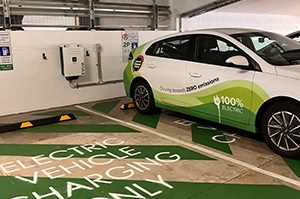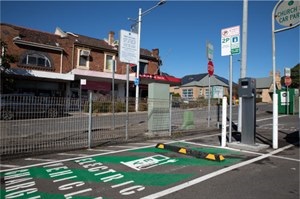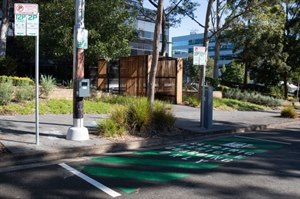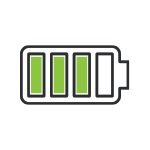Electric Vehicle Charging

To facilitate a widespread adoption of EVs, the City of Ryde encourages installations of charging stations across our City. This includes, but is not limited to, destination chargers that can be installed by residents, local businesses, shops and tourism attractions on their respective properties. EV chargers are an important complement to the growing number of fast-charging networks currently being rolled out by private suppliers including some initiatives co-funded by Government programs.
Learn about the different types of EV chargers, considerations for installation, and more below or download the digital brochure(PDF, 812KB).
Electric Vehicle Charging Stations
Council have installed charging stations at the following locations across the City of Ryde for community use.

ROWE STREET EAST CARPARK, EASTWOOD
View on Google Maps

CHURCH STREET CARPARK, RYDE
View on Google Maps

GIFFNOCK AVENUE, MACQUARIE PARK
View on Google Maps
Using the Electric Vehicle Chargers
To use the EV chargers, you will need to download the Exploren App, sign up and scan the QR code at the charging station.
Download the "Exploren App" app from the Google Play Store or App Store. A charging fee applies, please see the app for the current pricing.
EV drivers can also utilise the online tool Plugshare to locate the new EV chargers and provide feedback on their charging experiences.
Background
In December 2019, Council sought community feedback on Electric Vehicle (EV) uptake and charging infrastructure. According to the survey, 3 out of 4 respondents expressed they would consider purchasing an EV to reduce fuels costs and greenhouse gases emissions, and asked for more information in this space. Our community also pointed out that one of the main barriers to transitioning to clean technology vehicles was the shortage of charging stations.
Did you know...

By 2040, 61% of all passenger vehicle sales in Australia will be electric.

Electric vehicles create less air and noise pollution, and can be run completely carbon neutral when powered by renewable energy.

The EV industry is further developing the 'Vehicle to Grid (V2G)' technology that allows EVs to feed power back into the grid at times of high demand. Some models are now capable of feeding electricity.

The average motorist drives only 37km per day. EVs can easily accommodate this daily range with some models offering a range of 400km+ on a single charge.

Data has shown that 85% of all EV charging is done at home, and rarely from 0 to 100%. Also charging times are falling quickly as technology advances.
Find out More
What is an EV charger?
An EV charger or EVSE (Electric Vehicle Supply Equipment) is any smart device that dispenses electric charge to the vehicle. It may be wall-mounted or free-standing and includes one or more cords with special connectors that plug into the vehicle.
What is the difference between AC and DC charging?
The electricity grid delivers AC (alternating current) but EVs charge their batteries with DC (direct current). An electric vehicle has an on-board charger to convert AC power to DC.
DC chargers deliver power directly to the battery of EVs at a much higher rate but have a more complex design and cost more. Most home and destination chargers are AC.
For more information, visit the Charge Together Fleets website.
How fast can I charge my car?
Levels of charging based on speed.
| Level |
Format |
Description |
Charging Power |
Charging Speed (additional range per hour) |
|
Level 1
- Simplest, cheapest, slowest technology
- Can be used to top up daily use
- Requires a specialised cable usually supplied with the vehicle but no specialised installation equipment.
|
Single phase |
Produces a “trickle” charge through a standard existing power point |
2.4kW |
Will not fully charge an EV overnight |
|
Level 2
- Most common home and public charging level
- Connected directly to the electrical network via specific socket and plug and a dedicated circuit
- Can fully charge your EV overnight, usually within 5-8 hours.
|
Single phase |
AC power supplied using dedicated EVSE |
3.6kW – 9.6kW |
Up to 40 km / hour |
| Three phase |
AC power supplied using dedicated EVSE |
3.6kW – 22kW
|
Up to 120 km / hour |
Level 3
- Fast charging units typically found in commercial premises or en-route highway locations similar to fuel stations
- Requires significant panel and service upgrades and consequently is the most expensive to deploy.
|
DC |
DC fast charging power dedicated EVSE and electrical infrastructure |
25kW – 350kW |
Typically 70km / 10min or 420km / hour |
Where can I find a public charger and how do I know if they are available?
PlugShare is an independent register that provides an up-to-date database of electric vehicle charging stations. Visit the Plugshare website to find a station near you. Many EV cars also come with technology showing the nearest charging station.
Plug types for AC charging
 All electric cars come fitted with a charging plug. Prior to 2019, most vehicles in Australia used a Type 1 plug, however, starting from 1 January 2020 all new EVs will be fitted with a Type 2 plug (also known as Mennekes).
All electric cars come fitted with a charging plug. Prior to 2019, most vehicles in Australia used a Type 1 plug, however, starting from 1 January 2020 all new EVs will be fitted with a Type 2 plug (also known as Mennekes).
Do you have a Type 1 vehicle? Do not worry, there are adapters available that allow your vehicle to charge from any station with a Type 2 connector. It is as simple as adapting your phone.
Future developments and apartment blocks
About charging stations at multi-residential, mixed use and commercial developments in Ryde.
The City of Ryde encourages all future development applicants to consider future proofing their developments by provisioning EV charging infrastructure in the design of developments, as well as appropriate signage and dedicated charging spaces. Upfront installation will save on costs related to future additional electrical connections.
Can I install an EV charging station in apartment blocks? Yes, you can. EV charging solutions are available for everyone, including apartment dwellers with or without a dedicated parking space and can easily be facilitated by separate meters. Contact an EV charging provider for further information tailored to your situation.
Considerations for EV charger installation
Research the market by contacting some EV charging suppliers. View a list of providers on the Electric Vehicle Council website.
COMMERCIAL AND RESIDENTIAL CONSIDERATIONS
- Make sure the supplier provides you with a detailed quote containing equipment functions, correct usage, maintenance and warranty policies applied to hardware and installation
- Learn the charging requirements of your EV and follow the OEM's instructions at all times
- Find a location for the EV charger which is as close as possible to the parking location (this will drive cabling distance)
- Chargers require electrical supply via ceiling or subterranean conduits. Check the number of free slots on distribution boards and existing trays in carpark areas (for apartment blocks)
- Arrange an inspection of your property and get a full assessment of important details such as the capacity limitations of the existing distribution board
- Mount: Chargers must be positioned at a convenient height and can be wall or pedestal mounted
- Understand electricity tariffs for charging in different times of the day; take advantage of cheaper off-peak electricity rates
- Check with your electricity supplier to see if they offer Green Power or consider the installation of a solar PV system at your property to offset the electricity required to charge your EV
- We encourage you to engage a qualified electrician (EVSE trained to install the EV charging equipment in order to comply will all regulations in Australia. Most EVSE providers also offer installation.
COMMERCIAL ONLY CONSIDERATIONS
- Outdoor chargers must meet design standards for weather proofing and impact damage
- EVSEs can feature either a socket or a tethered plug and lead. Consult an EV charging installer for advice on the most suitable option for you, including the option to Bring Your Own Cable (BYOC)
- Commercial chargers: if authentication, remote control, payments, or management of electrical capacity are required, consider asking your EVSE supplier for options available to get a network monitoring system.
Where can I find more information?
Disclaimer
Please refer to official specifications when purchasing an electric vehicle, including manufacturers’ requirements and recommendations related to charging solutions. The City of Ryde recommends all users obtain their own independent professional advice before making any decision relating to the installation of EV chargers.
Any references to legislation are not an interpretation of the law. They are to be used as a guide only. The information in this publication is general and does not take into account individual circumstances or situations.